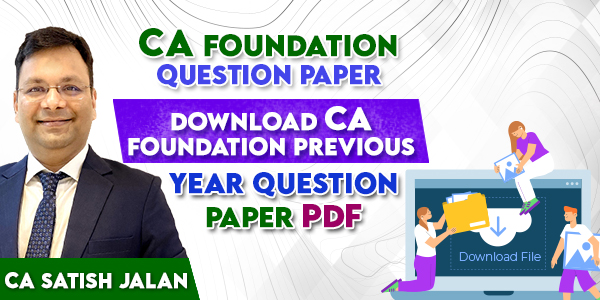25
Sep, 2023
How to Study For the CA Inter Audit and Assurance Exam?
-
CA Inter, CA
CA Satish Jalan
Becoming a CA is a great career option, but passing the CA exams is the first step. To pass the exams, it's crucial to have proper guidance. Audit and Assurance is a challenging subject in the CA Intermediate course, but there are principles you can follow to score well not only in this subject but also in other exams. This blog will discuss these principles and how you can score high marks in the CA Inter Audit exams. The tips provided are useful for both new and old course students, and the post will not only help you score well but also guide you on how to achieve exemption in Audit.
1. Important Topics in Audit and Assurance.
First and foremost, divide your CA inter syllabus into four major sections based on weightage:
A) Basic Concepts - It is approximately 40 marks and covers the following topics:
- Nature of Auditing
- Basic Concepts
- Audit Planning
- Environment and internal control.
- CIS Audit
B) Companies Act 2013- It covers about 20% of the paper. The following topics are covered:
- Companies Auditor- Fundamentals
- Companies Auditor - Power and Responsibilities
- Audits were conducted in accordance with the Companies Act of 2013.
- Schedule III
C) Audit Points - These cover approximately 20% of the paper and include topics such as -
-
Vouching
-
Verification
-
Government Auditing
-
Specialised Auditing
D) Auditing Pronouncements - These cover approximately 15% of the paper and include the following topics:
-
Standards on Auditing
-
Guidance Auditing Recommendations
Check out this playlist for revision: Audit and Assurance Revision Playlist.
2. Important SAs for the CA Inter Audit Exam
3. What Kinds of Questions Will Be Asked in the CA Inter Audit exam?
There will be three types of questions: Multiple-choice questions, Correct or Incorrect answers, and other Descriptive questions. Part 1 is the MCQs section, which will be of 30 marks and will include 20 questions of 1 mark each and 5 questions of 2 marks each. The paper will also have 14 mark Correct/Incorrect type questions. The remaining questions will be of the descriptive type.
4. How Many Questions Will Appear on the CA Inter Audit Exam?
The CA Inter Audit exam will consist of six questions, with students required to answer five of them. The first question, which will include Correct/Incorrect questions, will be compulsory. In the sixth question, there will be an internal choice.
5. Things to Remember During the Exam to Get Good Marks in the CA Audit Exam.
Now that we've finished our "before exam" part, let's concentrate on what we need to do during the exam. This is the section that will ultimately determine whether or not we pass the Audit exam. Language, sentence formation, and paper pattern are all covered.
Use Keywords
To do well in Audit exams, you must use technical keywords and effectively present your knowledge. It is not enough to have conceptual knowledge; you must also be able to incorporate relevant keywords used by ICAI in Study Material, RTPs, MTPs, and Suggested Answers. This demonstrates a higher understanding and can impress examiners, resulting in higher marks.
Formations of Sentences
Improving sentence formation is essential for performing well on audit exams. Recognize the problem and work on it until you have achieved mastery. Take practice tests, write answers, and evaluate where you need to improve. Taking mock tests regularly can help you track your progress and improve your presentation skills. Take advantage of the numerous test series available online to improve your skills.
Presentation of Answers to Achieve High Marks in the CA Inter Audit Paper.
Everything is dependent on this. Months of coaching, studies, and practice all come down to one thing: presentation. Here are some FAQs:
Q: Should I begin my responses on a new page?
A) Yes. 'Fresh Answer, Fresh Page,' Avoid answering on the same page.
Q: Should I write my answers in points?
A) It depends on the question of whether you should answer in points or not. If the question asks you to 'Explain, Describe, and Analyze,' avoid using points. Instead, use para-points. This post is an example of para points. However, if the question asks for 'Advantage/Disadvantage,' 'Process,' or 'Limitations,' go for points. Even if you're writing in points, don't forget to include an introductory paragraph before proceeding with your points.
Q) Does making charts help in scoring high marks?
A) Including charts in your answers can improve their presentation, potentially leading to higher marks. Making charts while studying for the exam can be a beneficial habit to develop. It not only improves the visual appeal of your answers, but it also draws the attention of examiners, potentially increasing your Audit exam score.
Additional points-
-
Highlight the keywords and key points. This emphasises your point and directs the paper checker's attention in the right direction. This, in turn, helps you get good marks.
-
Use All Capital letters. If you want to emphasise a specific keyword, write it in capital letters. This shows the paper checker that you know what you're talking about, saves him time searching for keywords, and raises your marks.
***Amendments are Important***
The ICAI tends to place a high value on amendments to keep its students updated. That is why you should always go over the amendments twice. Because the ICAI is very strict about checking some topics, do not rely too heavily on these chapters, which are not very scoring.
Try to remember the name of the heading or the name of the auditing standards using mnemonics, which will also help you place them in the exam.
Popular Posts






No Comments